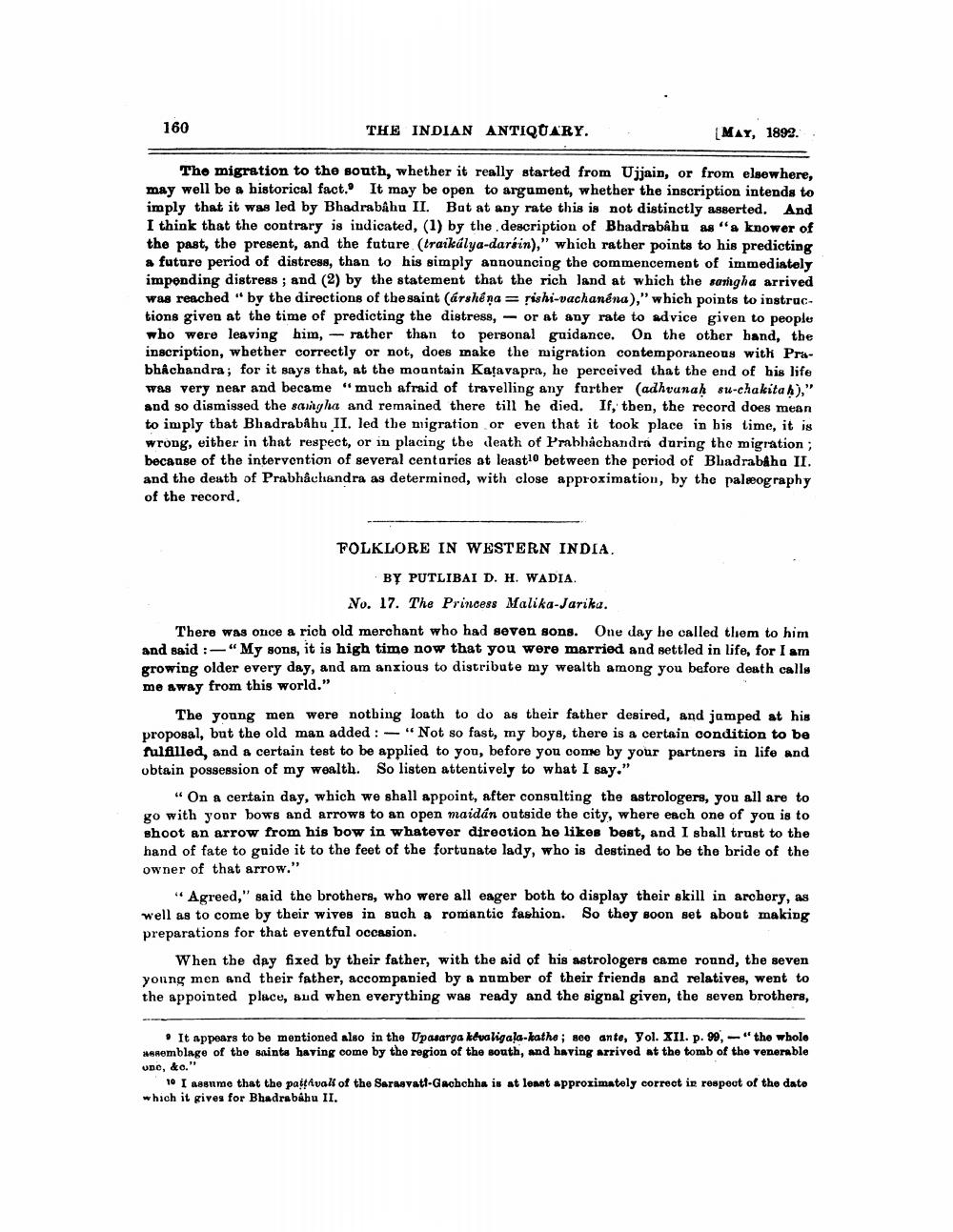________________
160
THE INDIAN ANTIQUARY.
[MAY, 1892.
Tho migration to the south, whether it really started from Ujjain, or from elsewhere, may well be a historical fact. It may be open to argument, whether the inscription intends to imply that it was led by Bhadrabahu II. But at any rate this is not distinctly asserted. And I think that the contrary is indicated, (1) by the description of Bhadrababu as "a knower of the past, the present, and the future (traikálya-darbin)," which rather points to his predicting a future period of distress, than to his simply announcing the commencement of immediately impending distress; and (2) by the statement that the rich land at which the samgha arrived was reached by the directions of the saint (arshéna = pishi-vachanéna)," which points to instractions given at the time of predicting the distress, - or at any rate to advice given to people wbo were leaving him, - rather than to personal guidance. On the other hand, the inscription, whether correctly or not, does make the migration contemporaneous with Prabhachandra; for it says that, at the mountain Katavapra, he perceived that the end of his life was very near and became "much afraid of travelling any further (adhvanah su-chakitah)," and so dismissed the samgha and remained there till he died. If, then, the record does mean to imply that Bhadrabåhu II. led the migration or even that it took place in his time, it is wrong, either in that respect, or in placing the death of Prabhachandra during the migration; because of the intervention of several centuries at least10 between the period of Bhadrabdho II. and the death of Prabhachandra as determined, with close approximation, by the palæography of the record.
FOLKLORE IN WESTERN INDIA,
BY PUTLIBAI D. H. WADIA.
No. 17. The Princess Malika-Jarika. There was once a rich old merchant who had seven sons. One day be called them to him and said :-"My sons, it is high time now that you were married and settled in life, for I am growing older every day, and am anxious to distribute my wealth among you before death calls me away from this world."
The young men were notbing loath to do as their father desired, and jumped at his proposal, but the old man added : - "Not so fast, my boys, there is a certain condition to be fulfilled, and a certain test to be applied to you, before you come by your partners in life and obtain possession of my wealth. So listen attentively to what I say."
"On a certain day, which we shall appoint, after consulting the astrologers, you all are to go with your bows and arrows to an open maidán outside the city, where each one of you is to shoot an arrow from his bow in whatever direction he likes best, and I shall trust to the hand of fate to guide it to the feet of the fortunate lady, who is destined to be the bride of the owner of that arrow."
"Agreed," said the brothers, who were all eager both to display their skill in archery, as well as to come by their wives in such a romantic fashion. So they soon set about making preparations for that eventful occasion.
When the day fixed by their father, with the aid of his astrologers came round, the seven young men and their father, accompanied by a number of their friends and relatives, went to the appointed place, sud when everything was ready and the signal given, the seven brothers,
It appears to be mentioned also in the Upasarga kevaligala-kathe; see ante, Vol. XII. p. 99,-"the whole #pemblage of the saints having come by the region of the south, and having arrivod at the tomb of the venerable UDC, &c."
10 I assume that the paitavali of the Sarasvatt-Gachchha is at least approximately correct in respect of the date which it gives for Bhadrabahu II.




